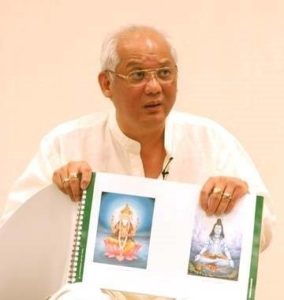Karma means “action” and “deed” in Sanskrit. Karma is the Law of Cause and Effect, Action and Reaction, Sequence and Consequence. We are constantly setting causes in motion, every moment, through our acts, words, and even thoughts. For every action set in motion, a corresponding and correlative effect comes back. This is how the Universe maintains harmony, balance, and equilibrium.
The ‘Law of Karma‘ is possibly the most crucial factor which shapes our lives. Master Choa Kok Sui has strongly emphasized the teachings of this law, and this concept was introduced in the very first workshop that a student takes in the MCKS Pranic Healing and Arhatic Yoga system. So, let’s try to understand what ‘karma’ means.

Understanding the Law of Karma
While the ‘Law of Karma‘ comes up in Hindu and Buddhist philosophy. The concept is universal and is taught in just about every tradition. It is essential to note the emphasis on the word Law. In physics, a ‘Law’ is a statement that is an expression of fact, deduced from observation to the effect that a particular natural or scientific phenomenon always occurs if certain conditions are present. According to the ancient teachings, the ‘Law of Karma‘ is unbreakable. Moreover, without exception, every self-conscious being in the Universe, , is subject to the ‘Law of Karma.’
So, how does the ‘Law of Karma‘ work? Let’s go into a little detail. The best way to understand it is through the Biblical phrase, “You Reap What You Sow” (Galatians 6:7).
What seed would you plant if you wanted apples? The answer obviously is apple seeds. It is the Universal truth that what a man sows is what he will reap. You may want mango, but an apple is all you will get if you plant an apple seed. If you want other fruits, then you need to plant different seeds.
Also, within this analogy lies another vital concept. There is a multiplier effect. When you plant an apple seed, you get an apple tree that produces several apples. As MCKS taught, “One grain of wheat sown may come back to you about 120 grains of wheat.” The critical word that is emphasized here is the word ‘may.’ While it may not be able to control how much comes back, there will certainly be a multiplier effect.
Why is this important? If we know and understand Karma properly, we can change and modify our destiny accordingly. Therefore, we must create actions that inevitably lead us to our expectations to get a specific result. Take, for example, the following:
- If you want to be treated fairly, then you need to treat people fairly
- If you want people to be nice to you, then you need to be nice to other people
- If you want to be loved by others, you have to be loving and kind
- If you want to be respected, then you need to respect others.
- If you want inner peace, try helping others be peaceful.
Therefore, we need to decide what we look forward to in our lives. Some of us are looking for higher education, while some are looking for success, and some are just looking for happiness. So how do we use the ‘Law of Karma‘ and achieve what we want? MCKS has explained it in the easiest way possible. He said, “Do unto others what you would have them do unto you”, and also, “Do not do unto others what you would not have them do unto you.” This is actually what is called the Golden Rule. The ‘Golden Rule’ is actually the spiritual technique to create your destiny.
The Golden Rule
The ‘Golden Rule’ is also universally taught through many religions. It can be applied positively (the yang form) as well as negatively (the yin form).
- The Law of Karma, when applied positively, manifests as the ‘Yang Golden Rule’ – “Do unto others what you would have done unto you.” This rule can be applied to get what you want or desire. In other words, if you want to be helped in times of need, help others in need. If you want to be treated nicely, treat others nicely, too. If you want your life blessed with prosperity and abundance, be charitable by helping needy people. If you want cordiality and harmony, be courteous to others.
- The Law of Karma can also be used to avoid undesirable things or events when applied to the ‘Yin Golden Rule’ – “Do not unto others what you would not have them do unto you.” Hence, treat others honestly and fairly if you do not want to be cheated or swindled. If you do not want to get hurt, refrain from harming others. If you do not want to be judged, do not judge. If you do not want to experience hunger, feed the poor. If you do not want your goods stolen, do not take what does not belong to you.
When you apply the ‘Golden Rule,’ it will produce harmony and prosperity in your life and protect you from the vicissitudes of life. So, if we do not want people to lie to us, we need to be truthful to others. If we do not want people to cheat us, we need to be honest with others. If you want a better life, practice the Meditation on Twin Hearts and bless others in the world for a better life. A similar rule applies to money and prosperity. If we want money, we have to give money first. We must help the poor by donating a specific portion of our earnings to them. If we do not want to be hungry or starve in our lives, we need to feed the people who do not have food for themselves. We need to help people in times of disasters and calamities to get help from others in times of need. Practice giving to receive. This is how you will plant the seed of good karma for the future, and as per the ‘Golden Rule,’ this will be returned to us manifold. As the law says, what you plant is what you will reap. Likewise, without being generous, you cannot be wealthy. If you do not plant, how will you reap?
The ‘Law of Karma‘ is also the basis of the command given by Lord Christ to “love your enemy.” Things will only aggravate if someone returns anger with anger and hatred with hatred. But if a person returns hatred and anger with love and kindness, it will result in peace and harmony.
When the Law of Karma is applied positively, it will give us the desired results and make us happy and peaceful. If individuals and nations adequately use this Universal law, it can bring lasting world peace!
Does the law always apply?
Many raise pertinent questions such as “Why do bad things happen to good people?” and “Why do disasters happen?” and “Why do some people suffer?” and so forth.
The answer is like this: a “good person” will not always have been a good person since none of us are perfect. At some point, either earlier in the present lifetime or in a preceding lifetime, the person must have behaved in an unpleasant, harmful, negative, or inappropriate way. Every action must and always have a corresponding reaction at some future point.
This brings us to another important concept: Karma and reincarnation are inextricably linked with each other. You can’t have one without the other. One single lifetime is by no means long enough to reap the full effects of every cause we may have set in motion during that lifetime.
Also, some people have a one-sided view of Karma. Some people say things like, “Karma’s going to get that person who wronged me.” But in doing so, they completely ignore the fact that the person wouldn’t have been able to wrong them or harm them in the first place if it wasn’t for their OWN negative Karma. You must realize that karma is never one-sided. For every effect, there was a cause. For every cause, there will be an effect. According to Madam Blavatsky:
“There is not an accident in our lives, not a misshapen day, or a misfortune that could not be traced back to our own doings in this or in another life.”
According to MCKS:
If you have worked out most of your negative karma and have not harmed anybody, then you have nothing to fear. Nothing can harm you. The Law of Karma is unbreakable. This is the meaning behind the statement: “my righteousness is my shield.” Literally, nothing can harm such a person. A thousand or million people may fall beside this person, but not even a single strand of hair will be touched!
So when bad things happen to us, it is a good idea to pause and reflect, to examine if we may have created the cause in the past, and to refrain from creating those mistakes in the future.
How do I verify if Karma exists?
One of the hallmarks of the Pranic Healing and Arhatic Yoga system is that students are encouraged to verify and validate the principles and teachings before accepting them. Now, is it possible to verify and validate the existence of the Law of Karma? This is what MCKS himself had to say in his book The Ancient Art and Science of Pranic Healing:
You do not have to blindly accept my words. You can experiment by doing something not too negative and observe what happens. You can also try doing something positive, like tithing, and observe what happens. Very often, the ‘karmic effect’ is not on a lump sum basis but is done on a piecemeal or staggered basis, but the negative karmic effects are still devastating. I have personally experimented with and experienced the immediate impact of both positive and negative karma.
Applying the Law of Karma
According to MCKS, the Law of Karma can be used to have a better life. MCKS provided the following instructions:
- Generate good karma
- Avoid generating bad karma
- Neutralize past negative karma
While the first two steps are reasonably easy to understand, one may ask how we can neutralize the negative and evil karma from our past.
According to MCKS, it is possible to neutralize the negative karma by “learning the lesson that is to be learnt”, and utilizing the “Law of Mercy” and “Law of Forgiveness”. The Law of Mercy means that to receive mercy, one must always be merciful towards others. All forms of negative thoughts and emotions, injurious words, and cruelty towards others must always be avoided. The Law of Forgiveness means we should forgive and bless all those who have hurt us. It is necessary to forgive because it helps us to release all the pent-up negative emotions.
By working out and overcoming their negative karma, one is purified and gains inner strength and wisdom.


Really happy to read your blogs.
Very well written indeed.